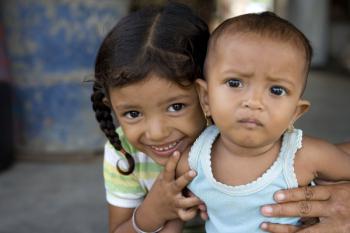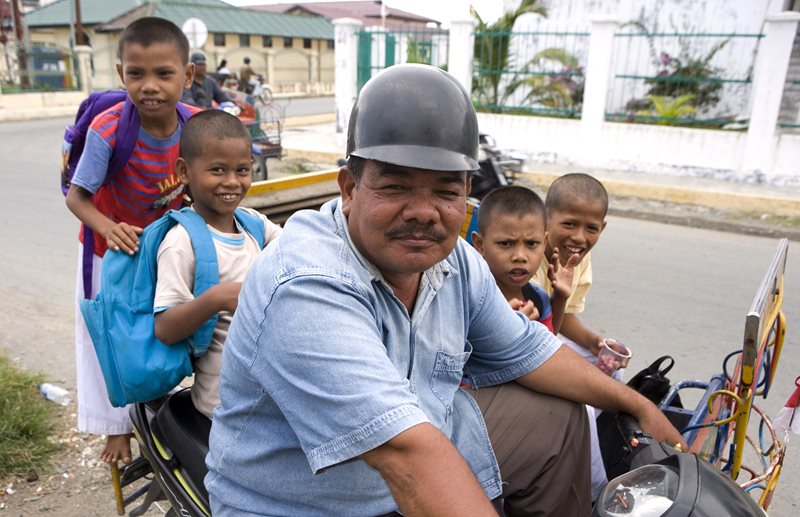A terrible natural disaster and its consequences

Little girl with her baby sister (photo: S. Posingis)
On the morning of 26 December 2004, a tsunami caused by an earthquake with the epicentre near Banda Aceh struck the coastal areas of the Indian Ocean. More than 130,000 people died in Indonesia, many more lost their homes and thousands of children were separated from their parents.
The 200 km coastline between the cities of Banda Aceh and Meulaboh was the worst affected area. Meulaboh is the capital of the district of Aceh Bara (West Aceh). The region continues to suffer some of the consequences of this natural disaster which hit a population already struggling with prolonged conflict. Although the government is improving the situation, in some aspects the area is still lagging behind others in the country. For example, schooling standards are lower here than in other provinces.
A high number of people are unemployed in the city. This has an impact on family life, and especially on children because their needs cannot be met. As parents work to eke out a living, many families fall apart. Some of the children in our care have lost both parents; in other cases they have one parent who has struggled to provide for them. Single mothers in particular find it hard to get a job and support so that their children can continue to live with them. Often children are also forced to go out to make some money; as a result they have no time to attend school because they are concentrating on surviving.
Providing relief to areas hit by the tsunami
What we do in Meulaboh

SOS Children's Village Meulaboh is situated in Lapang Village, about 3.5 km from the city centre and about six km from the sea shore.
In 2005, SOS Children's Villages Indonesia launched its first family strengthening programmes. Working with local authorities, we aim to support families at risk of abandoning their children and to encourage families to stay together. The SOS Social Centre in Meulaboh provides a package of services in the Gampong Cot and Suak Raya areas. We offer counselling, community support and psychological support. The programmes are designed to ensure that children have access to essential services, such as education, health care and psycho-social support. Families are given food or assisted with income generation, and they receive help when dealing with the authorities. By attending workshops and self-help groups people's parental skills and awareness of children's rights are improved. In addition, the SOS Kindergarten provides day care for up to 90 children. To parents who have to earn a living it is very important to have professional day care for their children, so that they are not forced to leave them unattended while they are at work.
For children whose families can no longer take care of them SOS Children's Villages provides a loving home in one of the 15 SOS families, where they grow up with their brothers and sisters and are cared for by an SOS mother. These children can attend the SOS Kindergarten, where they are taught together with children from local families. Later they attend schools in the area, which helps them become part of the local community. We work closely with the teachers in the area to ensure that the children are receiving the best possible education.
When young people are ready to move out of the SOS families they join our SOS Youth Programme when they start vocational training or go on to higher education. With the support of qualified professionals, the young people develop perspectives for their future, learn to shoulder responsibility and increasingly make their own decisions.